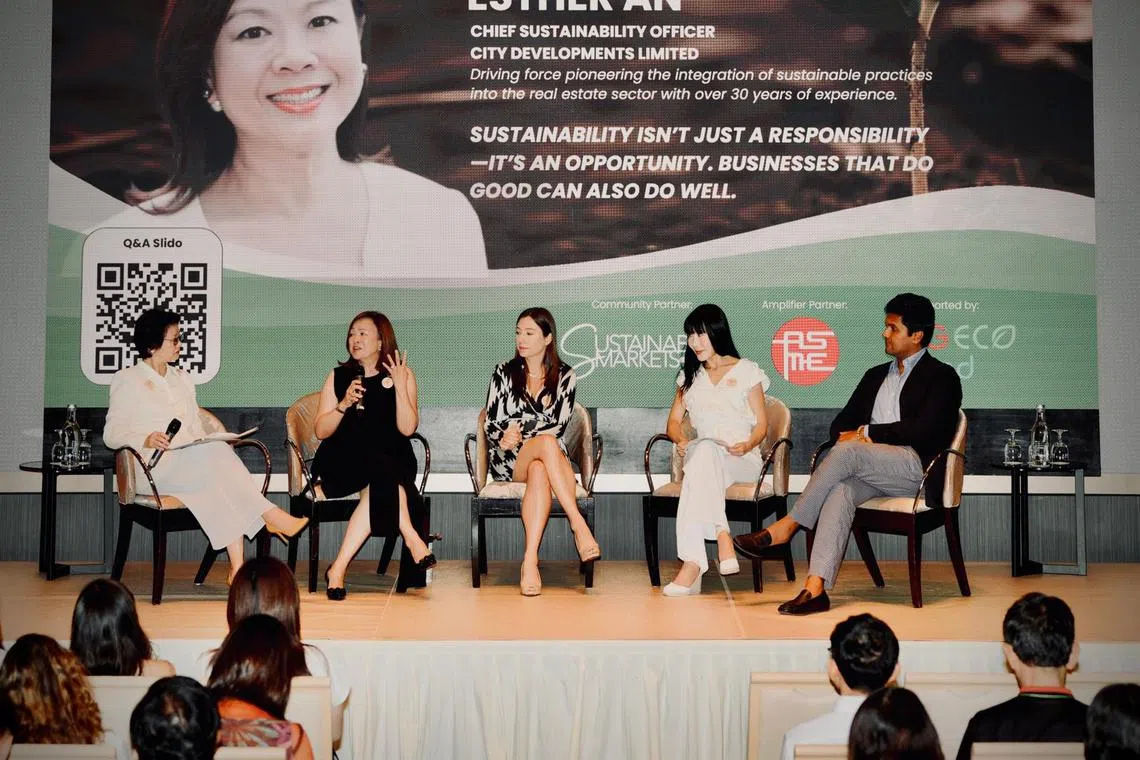Giving a leg up for small businesses using sustainability
Impact investing is the next step for such firms, with Bitcoin cited as a successful example

[SINGAPORE] Sustainability is “a buzzword for a billion different things”, said Vikas Garg, chief executive of mobile application abillion, which helps users find vegan and environmentally conscious products.
Therefore, companies must ask themselves who the consumers are, and what their own definition of the term is, he added.
The abillion founder was speaking at the Sustainable Seedling Summit, held at M Hotel last Thursday (Mar 27), on the topic of leveraging sustainability to create an impact on businesses. About 300 business owners attended the panel discussion.
Fellow panellist Eunice Yeo, founder of non-profit Peace of Art and event Sustainable Markets SG, emphasised the importance of defining three terms in particular.
The first is philanthropy, which can be embarking on charity work that is typically not part of a company’s business model.
The second is ESG – environmental, social and governance – which is a framework that every business should adopt as it advocates responsible practices such as having ethical supply chains, she added.
Navigate Asia in
a new global order
Get the insights delivered to your inbox.
The third term is impact investing. While the first two concepts “use capital to mitigate problems, impact investing uses capital to create positive (outcomes) while generating returns for your business”, she said.
She believes this is the future of businesses that want to do good.
Agreeing, Garg cited Bitcoin as an example of “a completely impact-focused investment”. “If anyone has read the original White Paper created on Bitcoin, (the cryptocurrency) is purely a revolutionary and disruptive idea focused on decentralising and creating financial security for people outside of global foreign reserve currencies,” he said.
“That is an impact investment.”

Another panellist, Stephanie Dickson, founder of sustainable events management and events consultancy company The Wedge Asia, added that clarity is key to creating such an impact – especially when it comes to helping small and medium-sized enterprises (SMEs) that are just getting started in their sustainability journeys.
In Singapore, about 99 per cent of businesses are SMEs. “They also (account) for 71 per cent of national employment, and I think this data” makes clear the importance of such small businesses in impact investing, said panellist Esther An, chief sustainability officer of City Developments Limited. “If Singapore wants to be net zero by 2050, wants to be in a city in nature, then SMEs must be included and play a more vibrant, important role.”
When staff are “clear on exactly what your mission is and what you want to be known… (they can) represent your company and that exercise”, Dickson added.
Helping smallholder farmers
In the same vein of helping smaller businesses, impact fund manager Abler Nordic announced on Mar 24 that it launched the Sustainable Oil Palm Replanting in Indonesia (Sopri) project, in partnership with Temasek Foundation, sustainable palm oil producer Musim Mas and global impact investor Livelihoods Funds.
Oil palm production can be a major driver of deforestation and climate change. Smallholder farmers make up a significant proportion of the industry, but they often lack the access to the resources that would help them switch to more sustainable practices.
Sopri addresses the issue by helping these farmers gain better access to financing and schemes to sustainably replant oil palms. The initiative grows their income while preventing them from encroaching on forest areas for agriculture.
In its first phase, the project will support 400 smallholder farmers across 400 hectares of land in Sumatra, through long-term replanting loans and financial literacy training – among other resources – to promote responsible land use.
The farmers will, in turn, commit to avoiding forest encroachment, which will be monitored through satellite and on-the-ground checks. Sopri is designed to demonstrate that sustainable replanting is both financially viable and scalable, with future phases of the project aiming to reach more than 20,000 smallholders.
Sopri is part of Abler Nordic’s Climate Smart Fund, which is now in the pilot phase with US$10 million in funding from the Norwegian Ministry of Climate and Environment. Abler Nordic aims to expand the fund to US$40 million in its first close.
Temasek Foundation strengthens Sopri’s blended finance model by setting aside catalytic capital to guarantee and de-risk loans to smallholders. This reduces financing costs for the farmers, and also de-risks private investment.
Carolyn Lim, senior manager of corporate communications at Musim Mas, said the company will measure outcomes in terms of the number of independent smallholders trained. The training covers good agricultural practices, financial literacy and basic administrative skills.
“Thereafter, these trained smallholders will be offered Abler Nordic’s Climate Smart Fund to assist them with sustainable replanting,” she added. “They are not obligated to take up this fund, but they will have the option.”
The loan amounts vary, depending on the needs of each smallholder. Some farmers may require loans of up to 75 million rupiah (S$6,100) a hectare, while others may need just 20 million rupiah or less a hectare, said Lim.
Heng Li Lang, head of climate and liveability at Temasek Foundation, said: “This pilot initiative will be a game-changer. By unlocking finance with catalytic capital, smallholders can replant sustainably without bearing huge financial risks.”
Decoding Asia newsletter: your guide to navigating Asia in a new global order. Sign up here to get Decoding Asia newsletter. Delivered to your inbox. Free.
Copyright SPH Media. All rights reserved.

